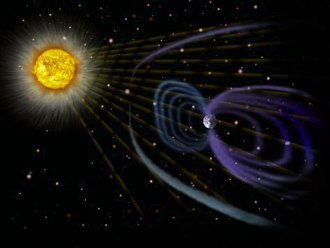


Space weather refers to changes in the space environment, particularly the region between the Earth and Sun. The "solar wind" from the Sun stream past the Earth and is mostly deflected by the Earth's magnetic field, but variations in the solar wind cause changes in the Earth's magnetic field.

Ocasionally, a huge release of magnetic energy, called a solar flare, occurs on the Sun. Flares can produce large quantities of x-rays which affect the Earth's atmosphere. They can also accelerate atomic particles (mostly protons) to very high speeds (a substantial fraction of the speed of light!). These high energy particles are dangerous to man and can reach the stratosphere where jetliners fly.
Most aspects of space weather affect us to some extent. The more our society becomes dependent on technology and the more we utilise space, the more we are affected by space weather. Some aspects of space weather are benevolent, and allow activities not otherwise possible such as long range radio communications. Some aspects are benign but fascinating such as the Aurora, and some are malevolent. Like terrestrial weather, it sometimes depends on the situation and the event.
The image below is an artists impression of the solar wind interacting with the Earth's magnetic field.

-
07/08/13FORECAST SOL: Normal
 MAG: Normal
MAG: Normal  ION: Normal
ION: Normal 
-
06/06/13GWPS 4.2 patch released for existing GWPS 4 customers
-
01/05/13ASAPS 6.2 patch in pre-release for existing ASAPS 6 customers
-
27/03/13Severe Space Weather Warning service now available



